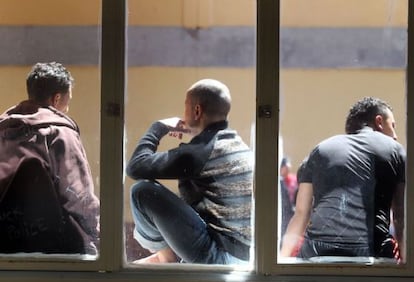Some immigrant holding centers worse than prison, says report
Torture prevention group also finds evidence of overcrowded jails

Overcrowded penitentiaries, allegations of mistreatment and prison-like conditions at immigrant detention centers are just some of the irregularities documented in two reports by the Council of Europe's Committee for the Prevention of Torture, which visited Spain in 2011 and 2012.
Although the group did not describe the situation as a generalized breach of human rights, it did underscore the existence of "problems that have been dragging on for years," says Celso Manata, one of the experts who took part in the visits and helped draft the reports.
The Civil Guard and the Catalan police (Mossos d'Esquadra) drew most of the committee's fire. "Yes, we have a few problems with the Civil Guard," admits Manata, who focuses most of his criticism on the practice of incommunicado detention, used for very serious crimes.
"We accept that it is a legal regime, but it is unacceptable that they cannot communicate with their lawyer, or to find wounded detainees who were unable to see a doctor while being held incommunicado," says Manata, who has over 30 years' experience as an analyst of human rights and prison conditions.
The Civil Guard and the Catalan police (Mossos d'Esquadra) drew most of the committee's fire
As for the Mossos, the reports document cases in which detainees were denied drinking water. The Portuguese expert also noted the use of rubber bullets and other projectiles by the Catalan police; in a widely reported case, a woman lost an eye during a public protest when a projectile hit her in the face. So far, the Mossos have denied any responsibility in the case.
Another focus of the investigation are the detention centers for undocumented migrants. "Sometimes they are worse than prisons. We detected many violations of the rules inside them. We asked for an investigation, but nothing has been done," complains Manata, speaking about a "feeling of impunity" on the part of authorities.
The representative from the Council of Europe rejects criticism from the Spanish government, which feels that the anti-torture committee relied too heavily on the testimony of prisoners.
"We've been doing this for many years. We know that inmates often lie to us, but we can detect it," claims Manata. "This committee wants to know the truth, and it wants authorities to make changes. If they think we are here to make trouble for them, then they're not getting the message."
Besides the detainees themselves, the reports list other sources consulted for the reports, including high-ranking officials in the Interior Ministry and regional governments, the president of the High Court, members of the General Council of the Judiciary and several non-profit groups.
Manata complains that the Spanish executive often responds to the committee's requirements by waving the law in its face. "What matters is not the law, but for the law to be obeyed."
Of all the irregularities detected in Spain, two were of special concern to the committee. The first is overcrowding at many penitentiaries, most especially La Modelo in Barcelona. "It's impossible for human rights to be respected there, it's so overcrowded...We don't see authorities doing anything to resolve it. Now they tell us they don't have the money to build another center; alternative measures are required," Manata says
The second major problem is the mechanical restraint system used at juvenile detention centers, where some youngsters are fixed to their beds for unspecified periods of time. "In many occasions the use of such a drastic measure is not justified in relation to the event that triggered it," says Manata.
Tu suscripción se está usando en otro dispositivo
¿Quieres añadir otro usuario a tu suscripción?
Si continúas leyendo en este dispositivo, no se podrá leer en el otro.
FlechaTu suscripción se está usando en otro dispositivo y solo puedes acceder a EL PAÍS desde un dispositivo a la vez.
Si quieres compartir tu cuenta, cambia tu suscripción a la modalidad Premium, así podrás añadir otro usuario. Cada uno accederá con su propia cuenta de email, lo que os permitirá personalizar vuestra experiencia en EL PAÍS.
¿Tienes una suscripción de empresa? Accede aquí para contratar más cuentas.
En el caso de no saber quién está usando tu cuenta, te recomendamos cambiar tu contraseña aquí.
Si decides continuar compartiendo tu cuenta, este mensaje se mostrará en tu dispositivo y en el de la otra persona que está usando tu cuenta de forma indefinida, afectando a tu experiencia de lectura. Puedes consultar aquí los términos y condiciones de la suscripción digital.









































